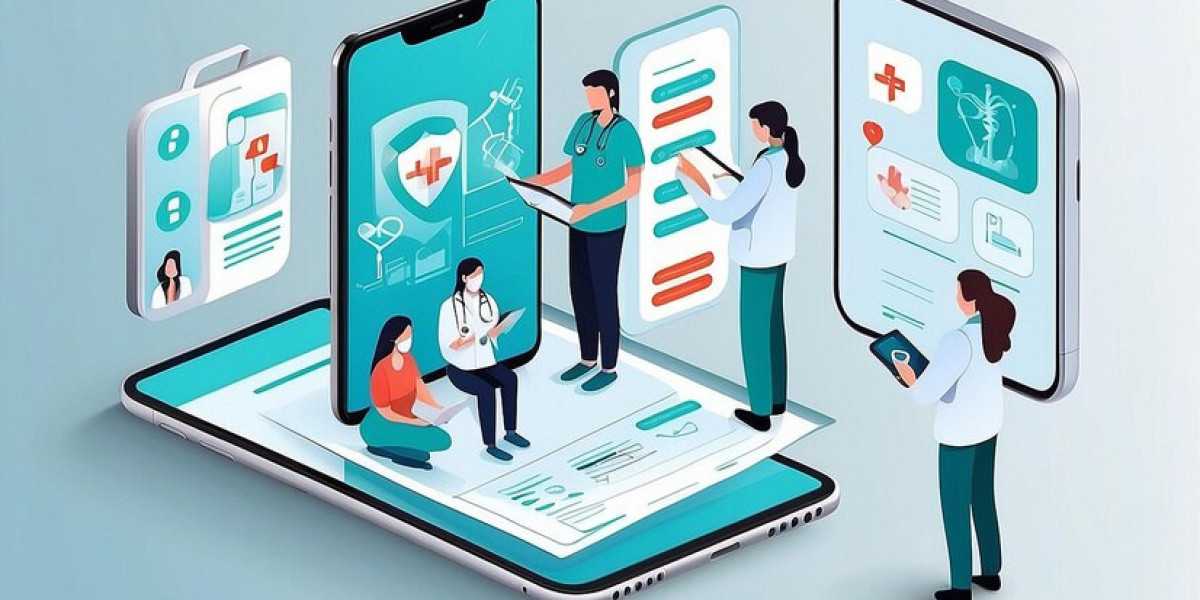The healthcare industry is experiencing a digital transformation, driven by rapid advancements in mobile app development. As mobile technology continues to evolve, healthcare providers are leveraging these innovations to improve patient care, streamline operations, and enhance overall efficiency. In this blog, we will explore the future of mobile app development in healthcare, highlighting key trends and innovations that are set to redefine the industry.
1. Telemedicine and Virtual Care: A New Era of Patient Interaction
One of the most significant trends in mobile app development for healthcare is the rise of telemedicine and virtual care. Telemedicine apps allow patients to consult with healthcare providers remotely, making healthcare more accessible, especially in rural or underserved areas. The COVID-19 pandemic accelerated the adoption of these apps, and their popularity continues to grow due to the convenience they offer.
Virtual care apps enable video consultations, secure messaging, and remote monitoring, allowing doctors to provide real-time advice and treatment. This trend is particularly beneficial for managing chronic conditions, where regular check-ins and timely interventions are crucial. The future of mobile app development in healthcare will see more robust and secure telemedicine platforms, integrating AI-driven diagnostics and personalized treatment plans to enhance patient outcomes.
2. AI and Machine Learning: Enhancing Diagnostics and Personalized Care
Artificial Intelligence (AI) and Machine Learning (ML) are revolutionizing mobile app development for healthcare by enhancing diagnostic capabilities and personalizing patient care. AI-powered healthcare apps can analyze vast amounts of data to identify patterns, predict health outcomes, and suggest treatment options. These technologies help in early disease detection, personalized medication management, and even predicting potential health issues based on patient history.
For instance, AI-driven apps can assist radiologists in interpreting medical images, reducing diagnostic errors, and speeding up the treatment process. Additionally, personalized care apps use ML algorithms to tailor health recommendations, fitness plans, and medication reminders based on individual health data, promoting healthier lifestyles and improving patient engagement.
3. Wearable Integration: Continuous Health Monitoring on the Go
Wearable technology, such as smartwatches and fitness trackers, is becoming increasingly integrated into healthcare mobile apps. These wearables collect real-time data on vital signs, physical activity, sleep patterns, and more, providing valuable insights into a patient's health. Integrating wearable data with healthcare apps enables continuous monitoring of patients, especially those with chronic conditions like heart disease or diabetes.
The future of mobile app development in healthcare will focus on seamless integration between wearables and mobile apps, allowing healthcare providers to receive real-time alerts about any abnormal readings. This integration will facilitate timely interventions, reduce hospital visits, and empower patients to take proactive steps in managing their health.
4. Blockchain Technology: Securing Patient Data and Enhancing Privacy
Data security and patient privacy are critical concerns in healthcare, and blockchain technology is emerging as a solution to these challenges. Blockchain can securely store and share medical records, ensuring data integrity and preventing unauthorized access. Mobile app development for healthcare is increasingly adopting blockchain to create decentralized, tamper-proof systems that safeguard patient information.
The adoption of blockchain in healthcare apps not only enhances data security but also improves interoperability between different healthcare systems. This technology allows patients to have more control over their data, granting access only to authorized parties, thus enhancing trust and transparency in the healthcare ecosystem.
5. Internet of Medical Things (IoMT): Connecting Devices for Better Care
The Internet of Medical Things (IoMT) refers to the interconnected network of medical devices and healthcare applications that communicate via the internet. This network includes devices like smart inhalers, connected insulin pens, and wearable ECG monitors that provide real-time health data to healthcare providers. IoMT is transforming mobile app development for healthcare by enabling remote patient monitoring, predictive analytics, and automated alerts.
In the future, healthcare apps will leverage IoMT to offer more proactive care, identifying potential health issues before they become critical. For example, a connected device can detect irregular heartbeats and alert a doctor, who can then provide immediate guidance through a mobile app, potentially saving lives.
6. Augmented Reality (AR) and Virtual Reality (VR): Enhancing Medical Training and Patient Care
Augmented Reality (AR) and Virtual Reality (VR) are not just for gaming; they are making significant inroads in healthcare mobile app development. These technologies are used for medical training, patient education, and even surgical planning. AR can overlay digital information onto the real world, helping surgeons visualize complex anatomy during procedures, while VR can simulate surgical scenarios for training purposes.
For patients, AR and VR apps provide immersive experiences that can help reduce anxiety, manage pain, and support mental health therapy. The future will see more sophisticated AR and VR applications that improve both the quality of medical training and patient care, making healthcare more interactive and effective.
Conclusion
The future of mobile app development in healthcare is bright, with numerous innovations set to transform the industry. From AI-driven diagnostics to wearable integration and secure blockchain solutions, these advancements are making healthcare more accessible, personalized, and efficient. As the demand for digital health solutions grows, healthcare providers must embrace these trends to stay competitive and continue delivering high-quality care.
With mobile app development for healthcare at the forefront of this digital revolution, the possibilities are endless. By leveraging cutting-edge technologies, healthcare apps are poised to reshape the future of patient care, making healthcare more proactive, connected, and patient-centric.








